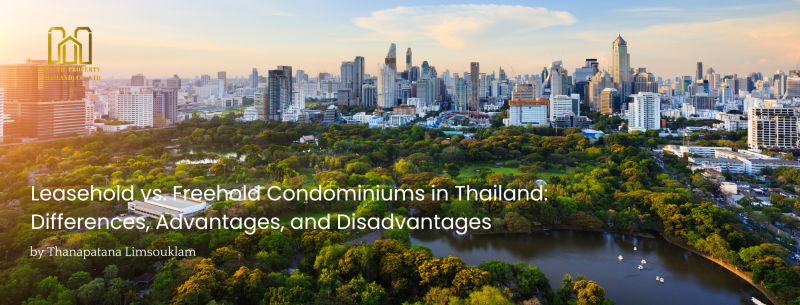Leasehold vs. Freehold Condominiums in Thailand: Differences, Advantages, and Disadvantages
When considering purchasing a condominium in Thailand, buyers typically encounter two types of property ownership: leasehold and freehold. Each has its distinct characteristics, advantages, and disadvantages, which are crucial to understand before making a decision.
Leasehold Condominiums
Definition: Leasehold ownership means that the buyer has the right to occupy and use the property for a specific period, usually up to 30 years, with the possibility of renewal.
Advantages
- Lower Initial Cost: Leasehold properties are generally more affordable than freehold properties, making them an attractive option for buyers with a limited budget.
- Location: Leasehold condos are often located in prime areas where freehold ownership may be restricted or prohibitively expensive.
- Flexibility: Leasehold arrangements can be more flexible in terms of negotiation and renewal terms.
Disadvantages
- Limited Ownership Period: The ownership period is limited to the lease term (up to 30 years), after which the property reverts to the landowner unless renewed.
- Value Depreciation: As the lease term progresses, the value of the leasehold property typically decreases, especially as it approaches the end of the lease.
- Restrictions on Modifications: Leaseholders may face restrictions on modifying the property, depending on the terms set by the landowner.
Freehold Condominiums
Definition: Freehold ownership grants the buyer full ownership of the property and the land it sits on, with no time limitations.
Advantages
- Permanent Ownership: Freehold ownership provides perpetual ownership of the property, offering long-term security and stability.
- Higher Property Value: Freehold properties tend to retain their value better over time and can appreciate significantly, especially in desirable locations.
- Freedom to Modify: Owners have more freedom to modify and renovate the property as they see fit, subject to local regulations.
Disadvantages
- Higher Cost: Freehold properties are typically more expensive than leasehold properties, requiring a larger initial investment.
- Limited Availability for Foreigners: Foreigners face restrictions on owning land in Thailand, and can only own freehold condos if no more than 49% of the total floor area of all units in a condo building are foreign-owned.
- Transfer Costs: The transfer of freehold property ownership can involve higher taxes and fees compared to leasehold properties.
Key Considerations for Buyers
- Purpose of Purchase: Buyers should consider their long-term plans. If the property is for short-term use or investment, leasehold might be suitable. For long-term residence or substantial investment, freehold is more advantageous.
- Budget: Leasehold properties offer a more affordable entry point, while freehold properties require a larger financial commitment but offer more security and potential for appreciation.
- Legal and Renewal Terms: Understanding the legal implications and renewal terms of leasehold agreements is essential to avoid future complications.
- Resale Value: Freehold properties generally have a better resale value and are easier to sell compared to leasehold properties.
Conclusion
Choosing between leasehold and freehold condominiums in Thailand depends on individual circumstances, financial capability, and long-term objectives. Leasehold condos offer affordability and access to prime locations but come with time limitations. Freehold condos provide permanent ownership and greater security, albeit at a higher cost and with certain restrictions for foreign buyers. Carefully weighing these factors will help buyers make an informed decision that aligns with their goals and preferences.
